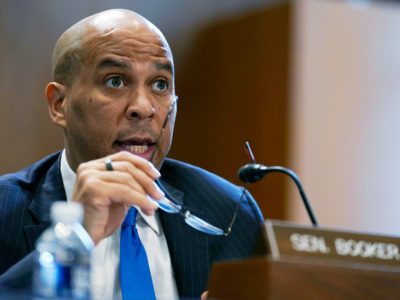As Congress prepares to write a new farm bill, animal welfare advocates are preparing to safeguard California’s Proposition 12 and similar laws regulating agricultural practices while also pushing to tighten standards for dog breeders, ban the export of horses for slaughter, and eliminate the last vestiges of animal fighting and dog racing in the United States.
A top priority for many in the movement is stopping the Ending Agricultural Trade Suppression (EATS) Act from being included in the farm bill. The EATS Act is aimed at stopping California and any other state from regulating the way farm animals are treated outside their borders.
The bill would forbid states from imposing “a standard or condition on the preharvest production of any agricultural products” that goes beyond federal requirements or the regulations of the state where the food commodities are produced.
Proposition 12, which survived a Supreme Court challenge, bans the practice of confining sows used for producing pork that’s sold in California and also imposed regulations on producers of veal calves and eggs.
The EATS Act is similar to an amendment that then-Rep. Steve King, R-Iowa, got included in a House-passed farm bill in 2018. The provision — officially labeled the Protecting Interstate Commerce Act — was ultimately rejected by the Senate.
Marty Irby, president and CEO of Competitive Markets Action, a lobbying group in Washington, D.C., held a July fly-in on Capitol Hill with about 20 farmers from 11 states representing some relatively small farm organizations, including the Kansas Cattlemen’s Association, National Dairy Producers Organization, Alabama Contract Poultry Growers Association, Contract Poultry Growers Association of the Virginias, and the Organization for Competitive Markets, all opposed to including EATS in the farm bill for various reasons.
Some are concerned that the bill violates states’ rights, others already meet Proposition 12 minimums, and some producers, dairy in particular, are concerned the bill is too broad, Irby said.
 This mobile billboard featuring images of EATS Act sponsors Sen. Roger Marshall, R-Kan., Rep. Ashley Hinson, R-Iowa, and Chinese President Xi Jinping was spotted roaming Capitol Hill in July. The URL cited on the advertisement directs to the website for Competitive Markets Action.
This mobile billboard featuring images of EATS Act sponsors Sen. Roger Marshall, R-Kan., Rep. Ashley Hinson, R-Iowa, and Chinese President Xi Jinping was spotted roaming Capitol Hill in July. The URL cited on the advertisement directs to the website for Competitive Markets Action.“I think the chance of EATS being included in the farm bill are very slim,” Irby said. “I was pleasantly surprised at the amount of opposition.”
He said there appears to be more opposition to the EATS Act than there was to King's amendment in 2018.
Tracie Letterman, vice president of federal affairs at the Humane Society Legislative Fund, the lobbying arm of the Humane Society, argues the EATS Act would nullify hundreds of state and local statutes and regulations regarding animal welfare, public health, and food safety.
“We believe that members of Congress, including the Agriculture committees will see that the bill undermines states’ right to legislate on behalf of their constituents and harms family farmers,” Letterman said.
Other groups fighting the bill include the American Society for the Prevention of Cruelty to Animals, and Animal Wellness Action, a group founded by former HSUS President Wayne Pacelle.
Congress has long been reluctant to preempt state regulations, but Sen. Chuck Grassley, R-Iowa, said in a June episode of Agri-Pulse Newsmakers that the Supreme Court’s majority opinion upholding Proposition 12 put it in Congress’ lap to decide whether states should be allowed to impose regulations that affect farming practices outside their borders.
Don't miss out sign up for a FREE month of Agri-Pulse news! For the latest on what’s happening in Washington, D.C. and around the country in agriculture, just click here.
The National Pork Producers Council argues the EATS Act “restores the long-standing relationship between states and the federal government under the U.S. Constitution's Commerce Clause, which grants Congress the exclusive power to regulate trade between and among the states and restricts states from regulating commerce outside their borders.”
Congress did act in 2016 to nullify state GMO labeling regulations with a bipartisan agreement that required companies to start disclosing biotech ingredients.
Theresa Lucas McMahan, executive director of Protect the Harvest, an organization that fights production restrictions on agriculture, said, “Severe regulations on food animal production will make food significantly more expensive and that will have the most noticeable impact on those who already struggle to feed their families.
While the EATS Act will likely mobilize the most intense opposition from animal welfare groups, some farm groups will also be working to oppose any animal welfare provisions added to the bill.
“Sadly, reauthorization of the farm bill every five years often becomes a battle of political gamesmanship and posturing for pet projects and/or points of view,” Lucas McMahan said.
“Regarding the numerous proposed provisions to be included in the farm bill aimed at animal welfare, we do not believe they meet the criteria for inclusion in the bill,” she said. “There are many existing animal welfare laws at the federal, state, and in many jurisdictions, the local level. Adding provisions promoted by animal rights groups seem to be counter to the primary objectives of the farm bill, as well as being redundant.”
Many of the animal welfare provisions introduced this year have bipartisan support in both the Senate and the House and at least one has significant support in the House Agriculture Committee.
The Fighting Inhumane Gambling and High-Risk Animal Trafficking (FIGHT) Act, sponsored by Senate Ag Committee member Cory Booker, D-N.J., would ban the broadcasting of animal fights as well as the trade of fighting roosters across U.S. borders. A bipartisan contingent of 19 lawmakers, including 15 members of the House Agriculture Committee, introduced a similar bill in the House. Despite being illegal, cockfighting and dogfighting still take place in the United States.
“Animal fighting is cruel, illegal, and unacceptable. It’s time we take stronger action to stop these heinous abuses against animals and protect them from being exploited for entertainment and profit. This bill will tighten enforcement to put a stop to illegal animal fighting,” Booker said in a press release.
The FIGHT Act would amend Section 26 of the Animal Welfare Act to ban simulcasting and gambling on animal fights in the U.S., regardless of where the broadcast signals originate; stop the shipment of mature fighting roosters through the U.S. mail; allow private citizens to act against illegal animal fighters; and enhance forfeiture provisions to include real property used in the commission of an animal fighting crime.
 Sen. Cory Booker, D-N.J. (AP Photo/Miriam Zuhaib)
Sen. Cory Booker, D-N.J. (AP Photo/Miriam Zuhaib)More than 230 organizations have endorsed the FIGHT Act, and the number is growing, Pacelle said, asserting that birds bred in the United States still end up in fighting pits in Mexico that are primarily run by drug cartels. The spread of poultry diseases is another concern expressed by those supporting the bill.
Noting the threat of poultry diseases, U.S. Customs and Border Protection announced in April that it confiscated 10 live roosters being smuggled into the United States at Laredo, Texas, likely for cockfighting.
Another provision gaining bipartisan support is the Save America's Forgotten Equines (SAFE) Act, led by Rep. Vern Buchanan, R-Fla. It would ban the transportation of U.S. horses to Canada or Mexico for slaughter. Sen. Robert Menendez, D-N.J., is sponsoring a similar bill in the Senate.
Domestic slaughter of horses has been banned by annual appropriations bills since 2005.
“For the last 16 years, no horses have been slaughtered in the U.S., but we are still shipping horses to Mexico and Canada to be slaughtered,” Pacelle said. “This issue needs to be seen in a new light. In 1990, 350,000 to 400,000 American horses were being slaughtered in the U.S., Mexico, and Canada. In 2007, we shipped 150,000 U.S. horses to Canada and Mexico. Today, 20,000 are shipped.”
While horse slaughter is a negligible economic activity today, Pacelle argues that it is still an animal welfare issue because there are no standards for slaughter in Mexico, the mixing of mares and stallions occurs during transportation, and the distances the horses travel are exceedingly long.
The Greyhound Protection Act, introduced by House Ag Committee member Salud Carbajal, D-Calif., would ban live dog racing, the use of animals as live lures and simulcasting. Pacelle said the federal government has authority on this issue because dogs are bred and transported across state lines for racing, and races are broadcast to numerous states for simulcast gambling.
Greyhound racing has been losing popularity in the U.S. for decades. In 2018, 12 dog tracks in Florida were shut down after a ballot initiative passed 69-31 to ban greyhound racing in the state. The Florida closures left just two remaining tracks in the country, both located in West Virginia according to greyhound advocacy group GREY2K USA.
Animal welfare advocates would also like to see the Puppy Protection Act included in the farm bill. The proposal would strengthen standards for USDA-licensed commercial dog dealers.
The bill would set specific minimum standards for dog care, including having solid flooring; indoor space that allows the tallest dog to stand up without touching the roof of an enclosure; square footage minimums that range from 12 square feet for dogs up to 25 inches long, to 30 square feet for dogs 35 inches and longer. There also are requirements for temperature control as well as food, water and exercise.
Rep. Brian Fitzpatrick, R-Pa., introduced the House version of the bill and Sen. Dick Durbin, D-Ill., introduced it in the Senate.
The American Kennel Club is fighting the bill, saying it would impose "arbitrary, one-size-fits-all mandates that could require small hobby breeders to place their dogs in industrial, commercial-style kennels and undermine quality breed-based care."
For more news, go to Agri-Pulse.com.

